Daily Vocabulary Words: List of Daily Used Words in Leading International Newspapers
Hi there. Welcome to this special section @ Wordpandit.
Our endeavour here is very simple: to highlight important daily vocabulary words, which you would come across in leading newspapers in the country. We have included the following newspapers in our selection:
• The New York Times
• The Washington Post
• Scientific American
• BBC
• The Guardian
• Psychology Today
• Wall Street Journal
• The Economist
We are putting in extensive work for developing your vocabulary. All you have got to do is be regular with this section and check out this post on a daily basis. This is your repository of words that are commonly used and essentially, we are posting a list of daily used words. Hence, this has significant practical application as it teaches you words that are used commonly in leading publications mentioned above.
Visit the website daily to learn words from leading international newspapers.
WORD-1: Variations
CONTEXT: Mr. Trump resorted to a string of false and misleading claims — on immigration, economics, energy and more — some of which were variations on familiar assertions.
SOURCE:
Explanatory Paragraph: Imagine you have a box of crayons with lots of different colors. Some are blue, some are red, and others might be yellow. Each color is not exactly the same as the others. This is like having variations. It means having things that are a bit different from each other, like having different colors to draw with so your pictures are more interesting and fun!
Meaning: The term for a change or difference in condition, amount, or level, typically with certain limits (noun).
Pronunciation: var-ee-AY-shuns
Synonyms: Differences, Changes, Varieties, Alterations, Modifications, Diversities
Usage Examples:
1. The teacher explained the variations in weather patterns across different parts of the world.
2. They noticed several variations in the design of the new model.
3. Genetic variations contribute to the uniqueness of each individual.
4. The chef enjoys creating variations of traditional dishes.
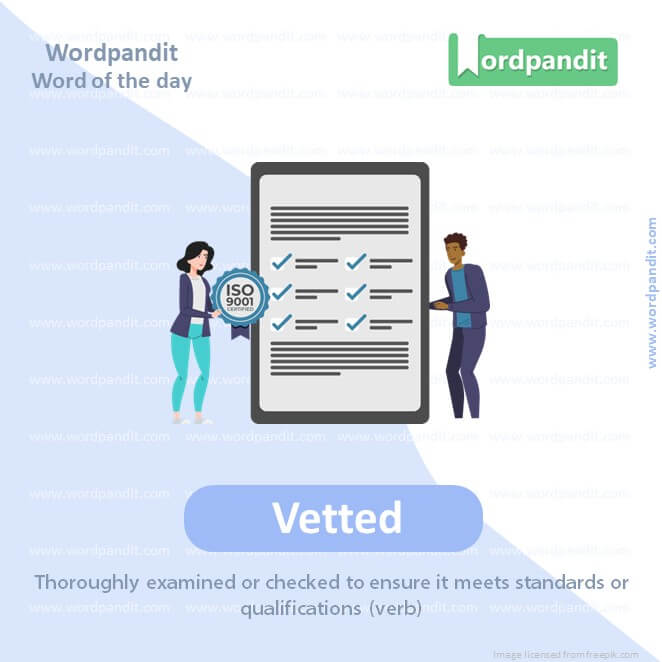
WORD-2: Vetted
CONTEXT: Information on the programs is publicly available and the migrants are vetted before being allowed to enter the country.
SOURCE:
Explanatory Paragraph: Imagine you draw a beautiful picture and you want to show it to everyone at school. But first, you show it to your mom to make sure it’s okay. Your mom looks at it carefully to see if it’s all good to share. When someone checks something carefully to make sure it’s okay or good, it’s like what your mom did with your drawing. That’s called vetting.
Meaning: Thoroughly examined or checked to ensure it meets standards or qualifications (verb).
Pronunciation: vet-ed
Synonyms: Checked, Examined, Screened, Reviewed, Inspected, Audited
Usage Examples:
1. The company vetted the candidates before hiring.
2. Before the article was published, it was vetted by an editor.
3. The safety protocols are vetted regularly.
4. All products are vetted for quality and safety.
WORD-3: Spanning
CONTEXT: The southern border with Mexico runs more than 1,900 miles. During Mr. Trump’s 2016 campaign he promised to build a wall spanning the border and have Mexico pay for it — which did not happen.
SOURCE:
Explanatory Paragraph: Imagine you and your friends are holding hands to make a chain from one end of the playground to the other. You are creating a line that stretches all the way across. Spanning is like that. It’s when something stretches from one point to another, covering the distance or space between them.
Meaning: Extending across or covering a distance or period of time (verb).
Pronunciation: span-ning
Synonyms: Stretching, Bridging, Covering, Extending, Reaching, Spreading
Usage Examples:
1. The bridge is spanning the river, connecting two towns.
2. Her career is spanning over three decades.
3. The exhibition is spanning two floors of the museum.
4. The network is spanning several countries.
WORD-4: Nonexistent
CONTEXT: the rate of inflation was indeed low under Mr. Trump, it wasn’t completely nonexistent, as Bureau of Labor Statistics data shows.
SOURCE:
Explanatory Paragraph: Imagine you’re looking for a magical unicorn in your backyard. You search and search, but you can’t find it because unicorns are make-believe; they aren’t real. When something is like that, something we talk about but it’s not really there or real, we say it is nonexistent. It’s like searching for a treasure chest in your room that isn’t there.
Meaning: Not existing or not present in any place or situation (adjective).
Pronunciation: non-ex-IST-ent
Synonyms: Absent, Imaginary, Missing, Unreal, Invisible, Phantom
Usage Examples:
1. The possibility of finding a solution soon was nonexistent.
2. The creature they were afraid of was nonexistent.
3. They searched for the file, but it was nonexistent.
4. The threat turned out to be nonexistent.
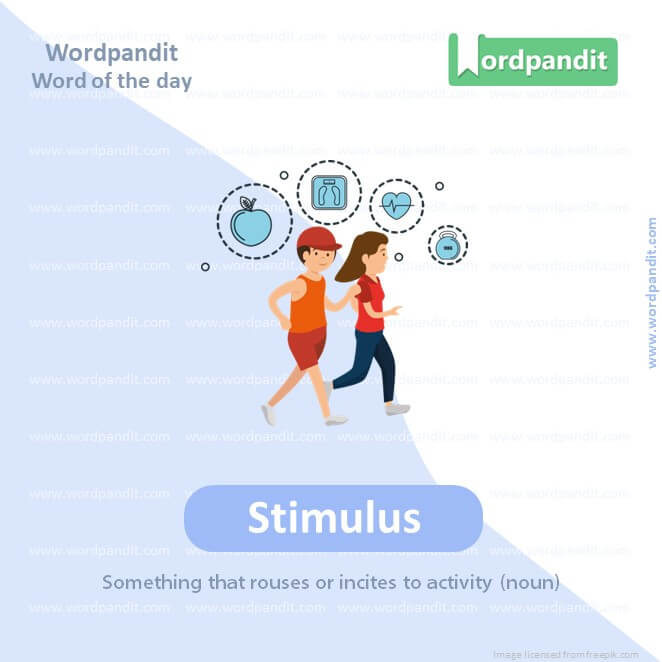
WORD-5: Stimulus
CONTEXT: the drivers of inflation were a rise in consumer spending as the country recovered from the pandemic — with the help of government stimulus payments — and supply shortages.
SOURCE:
Explanatory Paragraph: Imagine if you were feeling really sleepy, but then you smelled your favorite food cooking in the kitchen. Suddenly, you’re wide awake and ready to eat! That smell is like a little push or signal that makes you want to do something or feel a certain way. That’s what a stimulus is—a kind of nudge or signal that makes someone or something react.
Meaning: Something that rouses or incites to activity (noun) .
Pronunciation: STIM-yoo-lus
Synonyms: Prompt, Motivation, Incentive, Impulse, Catalyst, Trigger
Usage Examples:
1. The sound of the bell is a stimulus for the students to enter the class.
2. Economic stimulus measures were introduced to boost the economy.
3. Bright lights can be a stimulus for migraines in some people.
4. The teacher used rewards as a stimulus for good behavior.
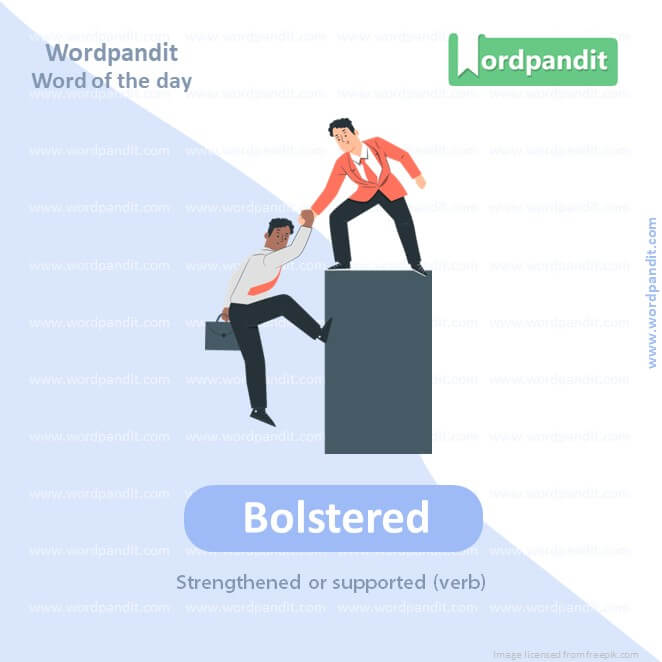
WORD-6: Bolstered
CONTEXT: The study shows that while the tax cuts have bolstered investment in the economy, they have provided only a modest — albeit, less than predicted — pay bump for workers, as The Times has reported.
SOURCE:
Explanatory Paragraph:Imagine you’re building a fort with pillows, and it starts to wobble. You add more pillows underneath to make it strong so it doesn’t fall down. By doing this, you’ve made your fort better and stronger. This is like bolstering something—when you support or strengthen it so it can do better or be more secure.
Meaning: Strengthened or supported (verb).
Pronunciation: BOL-sturd
Synonyms: Strengthened, Supported, Reinforced, Boosted, Upheld, Fortified
Usage Examples:
1. The team bolstered their defense for the next game.
2. Confidence was bolstered with positive feedback.
3. The walls were bolstered to prevent collapse.
4. Efforts to bolster the economy were successful.
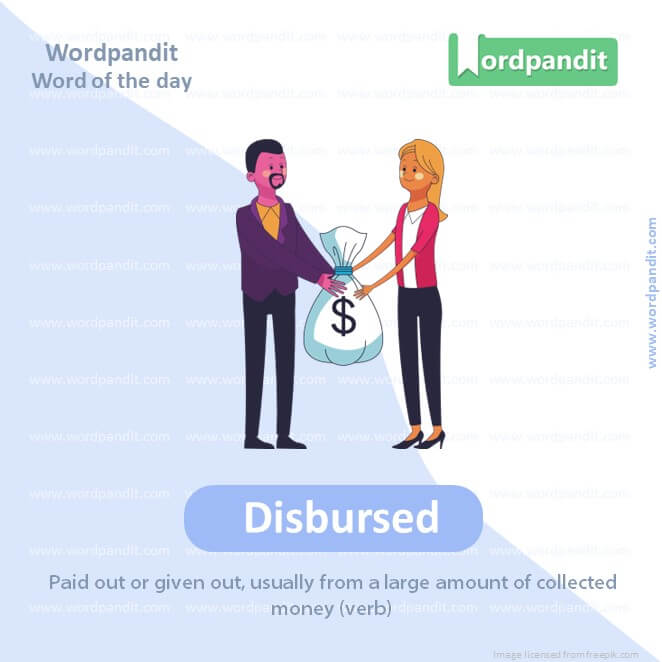
WORD-7: Disbursed
CONTEXT: The United States provided $88.6 billion for security in Afghanistan from October 2001 to July 2021, and disbursed about $75 billion, according to Pentagon figures.
SOURCE:
Explanatory Paragraph:Imagine you have a piggy bank where you save money. When it’s full, you open it and give some money to your family members to buy things they need. Giving out the money from your piggy bank to help or pay for things is like disbursing money. It means to take money that was saved up and spread it out where it’s needed.
Meaning: Paid out or given out, usually from a large amount of collected money (verb).
Pronunciation: dis-BURST
Synonyms: Distributed, Paid, Spent, Allocated, Issued, Handed out
Usage Examples:
1. The funds were disbursed among the winners.
2. Salaries are disbursed at the end of each month.
3. The grant was disbursed to support the research project.
4. Emergency aid was quickly disbursed to the affected area.
WORD-8: Scorching
CONTEXT: Three years after delivering a scorching denouncement of Donald J. Trump after the Jan.
SOURCE:
Explanatory Paragraph: Think about the hottest summer day when the sun makes the playground so hot that the slides feel like they could almost cook an egg. That really, really hot feeling from the sun is what we call scorching. It means something is so hot that it feels like it could burn you just by touching or being near it.
Meaning: Extremely hot or burning (adjective).
Pronunciation: SKOR-ching
Synonyms: Boiling, Blistering, Sizzling, Burning, Fiery, Broiling
Usage Examples:
1. It was a scorching day, with temperatures above 100 degrees.
2. The desert can get scorching during the day.
3. She felt the scorching heat as she opened the oven.
4. They walked through the scorching sands without shade.
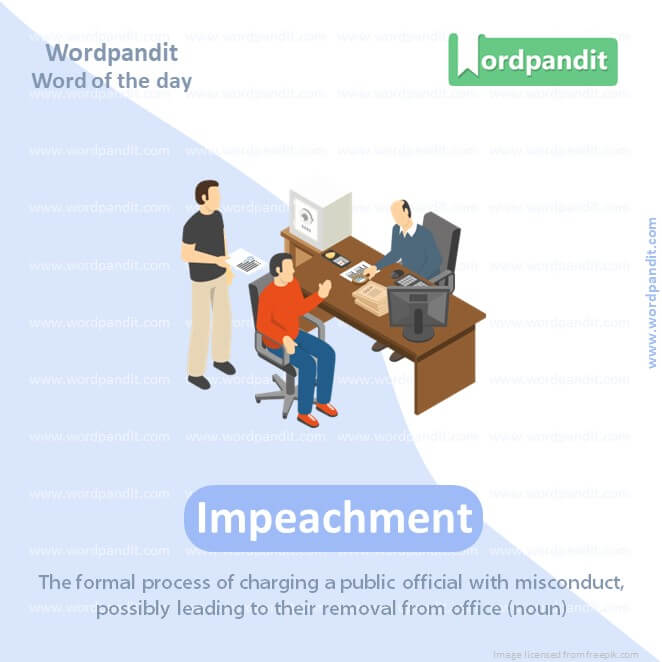
WORD-9: Impeachment
CONTEXT: But he also declined to vote to convict Mr. Trump during the former president’s second impeachment trial, indicating that the criminal justice system was the place to deal with him.
SOURCE:
Explanatory Paragraph: Imagine if there were rules for playing a game, but someone decided not to follow them on purpose. If everyone else playing the game decides that wasn’t fair, they might have a special meeting to decide if that person should be allowed to play the leader in the game anymore. Impeachment is like this but for very important leaders, like presidents. It’s a way of checking if they broke the big rules and deciding if they should be asked to stop being the leader.
Meaning: The formal process of charging a public official with misconduct, possibly leading to their removal from office (noun).
Pronunciation: im-PEECH-ment
Synonyms: Accusation, Indictment, Prosecution, Charge, Censure, Trial
Usage Examples:
1. The impeachment of the president was a major event in history.
2. Articles of impeachment were drafted by the committee.
3. The senator faced impeachment for misconduct.
4. The impeachment process involves both the House of Representatives and the Senate.
WORD-10 Dereliction
CONTEXT Former President Trump’s actions preceding the riot were a disgraceful dereliction of duty,” Mr. McConnell said in a speech after the trial had ended.
SOURCE:
Explanatory Paragraph: Imagine you had a job to feed your pet every day, but you decided to go play instead and forgot to feed them. Not doing your important job of taking care of your pet is like neglecting your duty or responsibility. When someone doesn’t do what they’re supposed to do, especially when it’s really important, that’s called dereliction. It means not taking care of something or someone when you really should be.
Meaning: The state of neglecting or abandoning duties or responsibilities (noun).
Pronunciation: der-e-LIK-shun
Synonyms: Neglect, Abandonment, Negligence, Disregard, Failure, Omission
Usage Examples:
1. The officer was charged with dereliction of duty.
2. Dereliction of these responsibilities can lead to serious consequences.
3. The property fell into ruin due to dereliction.
4. The report cited dereliction in following safety protocols.
Vocabulary Today
In the dynamically evolving spectrum of language, staying updated with ‘vocabulary today’ is an integral part of mastering a language. These topical, contemporary words breathe vitality into our communication, bridging the gap between language learning and language living. But, how can we effectively learn ‘vocabulary today’?
Grasping ‘vocabulary today’ begins with exposure to contemporary contents. Engaging with current publications, social media platforms, movies, music, podcasts, and digital content can dive you into the real-world usage of ‘vocabulary today’. These platforms imbibe the vocabulary of the day, reflecting the evolution in language.
To consolidate the learning of ‘vocabulary today’, utilize memory-enhancing tools. Flashcards, language learning apps, or memory-enhancement software can make your study session an engaging venture and enhance word retention.
However, the secret sauce to learning ‘vocabulary today’ is practice. Inculcating these words in your regular dialogues, written correspondences, or social media posts will reinforce your grasp over these words. It brings you closer to ‘vocabulary today’, enhancing your language adaptability and fluency.
Better understanding of ‘vocabulary today’ can be achieved by staying connected with diverse social platforms which bring words from across locations and cultures, expanding your linguistic understanding. Also, participating in language forums, discussion groups, or language exchange platforms provides great insights into ‘vocabulary today’.
In the final analysis, staying abreast with ‘vocabulary today’ is an exciting quest that requires consistent exposure, active practice, and social engagement. As you embrace this journey, you will find your language proficiency growing with every new word, enabling you to step into the dynamic world of contemporary language with confidence and mastery. Remember, ‘vocabulary today’ is not static, it flows like a river, always fresh, always changing, and always enriching!






